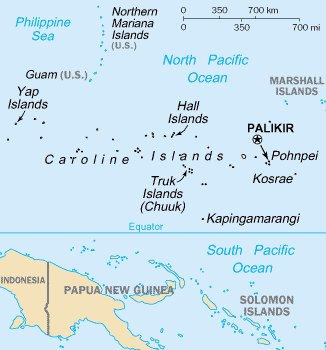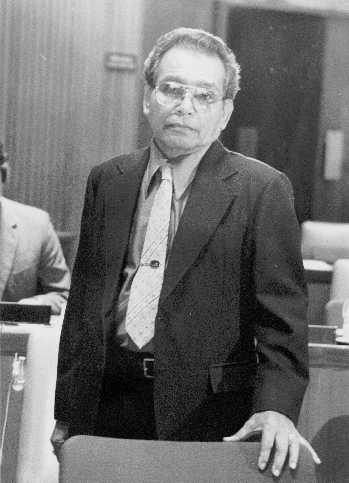|
Languages Of Palau
Palau, officially the Republic of Palau, is an island country in the Micronesia subregion of Oceania in the western Pacific Ocean. The Republic of Palau consists of approximately 340 islands and is the western part of the Caroline Islands, while the eastern and central parts make up the Federated States of Micronesia. It has a total area of , making it the sixteenth smallest country in the world. The most populous island is Koror, home to the country's most populous city of the same name. The capital, Ngerulmud, is located on the largest island of Babeldaob, in Melekeok State. Palau shares maritime boundaries with international waters to the north, the Federated States of Micronesia to the east, Indonesia to the south, and the Philippines to the northwest. The country was originally settled approximately 3,000 years BP by migrants from Maritime Southeast Asia. Palau was first drawn on a European map by the Bohemian missionary Paul Klein based on a description given by ... [...More Info...] [...Related Items...] OR: [Wikipedia] [Google] [Baidu] |
Belau Rekid
"" (; also spelt ""; ) is the national anthem of Palau. Officially adopted in 1981, the music was composed by Ymesei O. Ezekiel, to which the combined words of several authors were set. History The anthem was composed by Ymesei Ezekiel (9 January 1921 – 20 May 1984), a composer, musician and music teacher, during the time of the transition from the Trust Territory of the Pacific Islands, which at the time was using the Preamble (anthem), anthem of Micronesia, to the establishment of the Republic of Palau under the trust territory. A committee headed by member of the House of Delegates of Palau, House of Delegates Demei Otobed was established to adopt a national anthem in line with the new Constitution of Palau, constitution. Along with Otobed and Ezekiel, other members of the committee included historians and musicians Riosang Salvador, Kebekol Alfonso and Hermana Umetaro. The committee members collectively wrote the lyrics of the anthem. The anthem was officially adopted on ... [...More Info...] [...Related Items...] OR: [Wikipedia] [Google] [Baidu] |
Carolinian People
The Carolinian people (Endonym and exonym, endonym: Refaluwasch) are a Micronesian people, Micronesian ethnic group who originated in the Caroline Islands, with a total population of over 8,500 people in the Northern Mariana Islands. They are also known as Remathau in Yap's outer islands. ''Refaluwasch'' means "People of the Deep Sea." It is thought that their ancestors may have originally migrated from Asia and Melanesia to Micronesia around 2,000 years ago. Their primary language is Carolinian language, Carolinian, called ''Refaluwasch'' by native speakers, which has a total of about 5,700 speakers. The Refaluwasch traditionally have a Matriarchy, matriarchal society. Most Refaluwasch are of the Roman Catholic faith. The emigration of Refaluwasch to Saipan began in the early 19th century, after the Spain, Spanish reduced the local population of Chamorro people, Chamorro natives to just 3,700. They began to Emigration, emigrate; sailing from the Carolines, which had previous ... [...More Info...] [...Related Items...] OR: [Wikipedia] [Google] [Baidu] |
Senate Of Palau
The Senate of Palau is the upper house of the Palau National Congress (''Olbiil era Kelulau''). The Senate has 13 members serving four-year terms in multi-seat constituencies. Since January 2025, the Senate has 15 members. No political parties exist. The most recent election was held in November 2024. Membership The Constitution does not indicate the number of a members of the Senate. Every 8 years, the National Congress appoints a reapportionment commission to draw up and recommend a district map allocating seats in accordance with the population. Therefore, the number of senators may change as frequently as every 8 years. Any voter can challenge a reapportionment before the Palau Supreme Court. During the first legislature in 1981, there were 18 Senators, which was reduced to 14 in 1984. In 2000, the number dropped to 9, but in 2008, the number rose to 13, before dropping again to 11 in 2016. Committees The Senate of Palau has 12 standing committees. They are: President ... [...More Info...] [...Related Items...] OR: [Wikipedia] [Google] [Baidu] |
Palau National Congress
Palau has a bicameral legislature, the Palau National Congress (), consisting of the House of Delegates and the Senate of Palau, which both sit at the capitol complex in Ngerulmud, Melekeok State. The House of Delegates has 16 members, each serving four-year terms in single-seat constituencies. The Senate has 13 members, also serving four-year terms in multi-seat constituencies. In the last elections, held in 2020, only non-partisans were elected; no political parties exist. The congress is called Olbiil Era Kelulau (OEK) in Palauan or “House of Whispered Decisions". When it was founded, there were 18 senators. That number of them was changed in 1984 to 14. The number of senators changed again in 2000, when it was reduced drastically to 9. In 2008, it was raised once again, to 13.Welcome to the Palau National Congress Website! [...More Info...] [...Related Items...] OR: [Wikipedia] [Google] [Baidu] |
Raynold Oilouch
Raynold B. Oilouch (born 1965 or 1966) is a Palauan politician. He has served as the Vice President of Palau from 19 January 2017 to 21 January 2021, and again since 16 January 2025. Oilouch was elected vice president in the 2016 elections. He was also the Minister of Justice from January 2017 to January 2021, and minister of health since January 2025. Before his term as vice president, he served as senator from Ngchesar in the Senate of Palau The Senate of Palau is the upper house of the Palau National Congress (''Olbiil era Kelulau''). The Senate has 13 members serving four-year terms in multi-seat constituencies. Since January 2025, the Senate has 15 members. No political parties .... Oilouch has a bachelor's degrees of both social sciences and economics from Canberra College of Advanced Education. He has also been practicing law in Palau since 1998. References 1960s births 21st-century Palauan politicians Justice ministers of Palau Health minis ... [...More Info...] [...Related Items...] OR: [Wikipedia] [Google] [Baidu] |
Vice President Of Palau
Vice President of Palau is the second-highest position in the executive branch of the government of Palau, after the President of Palau, president. The vice president is elected in popular elections separate from presidential elections. When the president has been sworn in, the vice president will serve as a Cabinet of Palau, member of the cabinet and may have other responsibilities assigned by the president. The salary of the vice president has been US$65,000 annually since 2010 List of vice presidents See also *President of Palau *List of current vice presidents References Vice presidents, Palau Government of Palau Lists of office-holders by country of work, Palau, Vice-Presidents of Palau politics-related lists, Vice President Vice presidents of Palau, 1980 establishments in Palau {{Palau-stub ... [...More Info...] [...Related Items...] OR: [Wikipedia] [Google] [Baidu] |
President Of Palau
The president of the Republic of Palau is the head of state and head of government of Palau. The president is Direct election, directly elected to a four-year term, and can be reelected once in a consecutive manner. List of officeholders ; Status Latest election See also *First Lady of Palau *Vice President of Palau *High Commissioner of the Trust Territory of the Pacific Islands References Presidents by country, Palau Presidents of Palau, Palau politics-related lists, Presidents Lists of office-holders by country of work, Palau, Presidents of 1980 establishments in Palau {{Palau-stub ... [...More Info...] [...Related Items...] OR: [Wikipedia] [Google] [Baidu] |
Non-partisan Democracy
Nonpartisan democracy (also no-party democracy) is a system of representative government or organization such that universal and periodic elections take place without reference to political parties. Sometimes electioneering and even speaking about candidates may be discouraged, so as not to prejudice others' decisions or create a contentious atmosphere. In many nations, the head of state is nonpartisan, even if the prime minister and parliament are chosen in partisan elections. Such heads of state are expected to remain neutral with regards to partisan politics. In a number of parliamentary or semi-presidential countries, some presidents are non-partisan, or receive cross-party support. Nonpartisan systems may be de jure, meaning political parties are either outlawed entirely or legally prevented from participating in elections at certain levels of government, or de facto if no such laws exist and yet there are no political parties. ''De facto'' nonpartisan systems are most ... [...More Info...] [...Related Items...] OR: [Wikipedia] [Google] [Baidu] |
Presidential Republic
A presidential, strong-president, or single-executive system (sometimes also congressional system) is a form of government in which a head of government (usually titled " president") heads an executive branch that derives its authority and legitimacy from a source that is separate from the legislative branch. The system was popularized by its inclusion in the Constitution of the United States. This head of government is often also the head of state. In a presidential system, the head of government is directly or indirectly elected by a group of citizens and is not responsible to the legislature, and the legislature cannot dismiss the president except in extraordinary cases. A presidential system contrasts with a parliamentary system, where the head of government (usually called a prime minister) derives their power from the confidence of an elected legislature, which can dismiss the prime minister with a simple majority. Not all presidential systems use the title of ' ... [...More Info...] [...Related Items...] OR: [Wikipedia] [Google] [Baidu] |
Islam In Palau
Islam is a minority religion in Palau. History Spain (1500–1899) and Germany (1899–1914) ruled over the island, during which the Roman Catholic and Protestant churches were active. During Japan's occupation (1919–1947), Shintoists and Buddhists expanded their religious activities. Islam began to spread in Palau in the first decade of the 21st century when migrant workers started arriving on the archipelago. In Palau, primarily in the early 21st century, around 500 Muslims – migrant workers from Bangladesh and Pakistan – reside. The Muslims from Bangladesh have established the Bangladesh Islam Association, with Mohiuddin (Mohiuddin) serving as its president. For the native Palauan population, the minimum wage is 2.50 dollars per hour, while for foreign workers, it is only 1.50 dollars. The number of foreign workers complaining about low wages and harsh treatment by employers is increasing. In December 2005, the Palauan government imposed a moratorium on hiring n ... [...More Info...] [...Related Items...] OR: [Wikipedia] [Google] [Baidu] |


